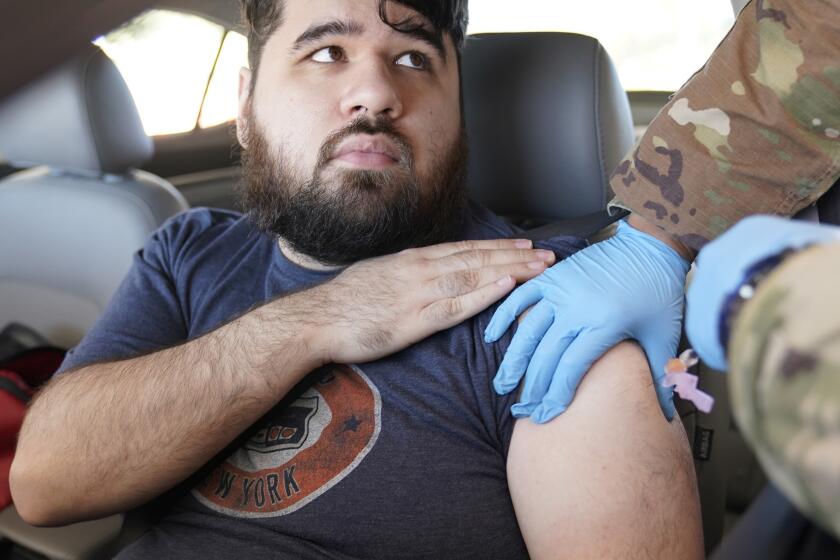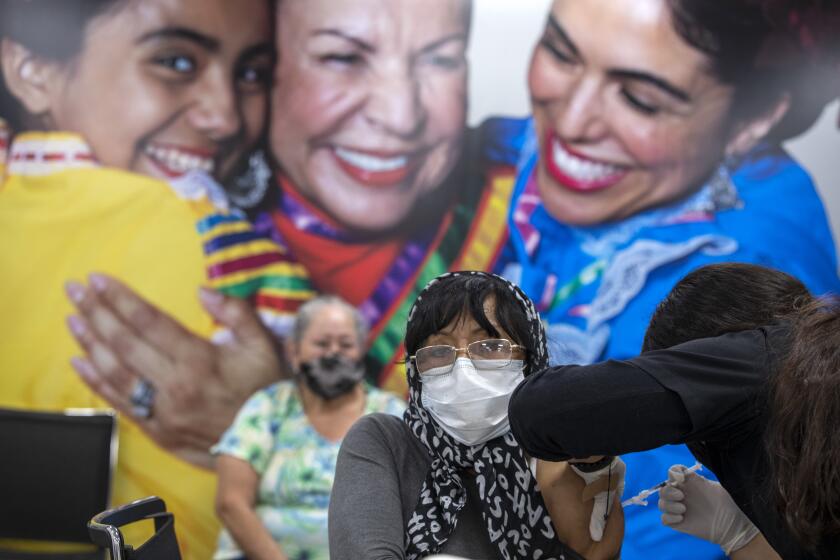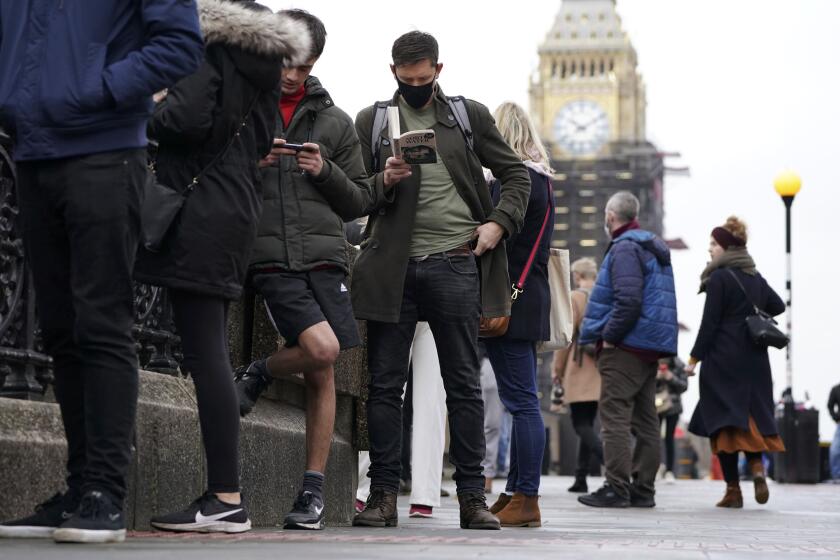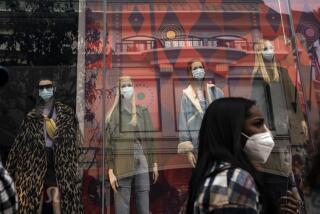Omicron raises COVID-19 worry but not precautions, poll finds
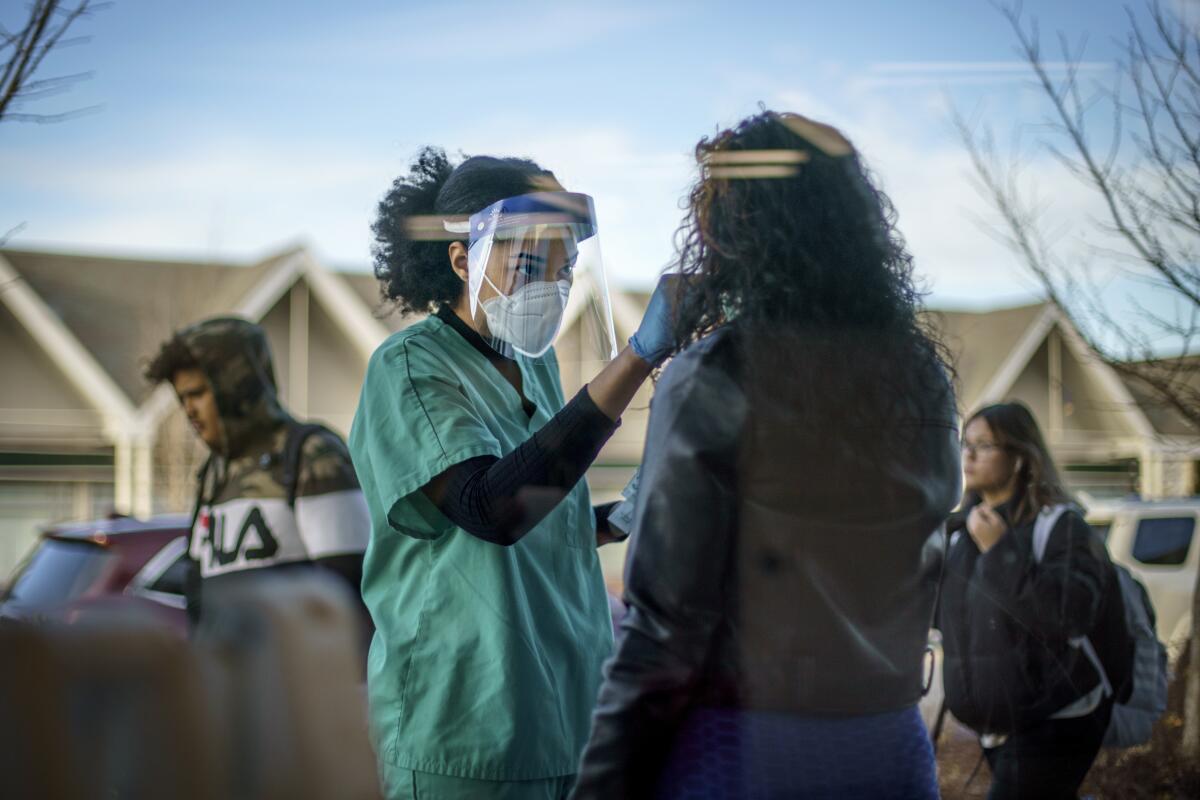
- Share via
CHICAGO — As the Omicron variant sparks worldwide fears of renewed COVID-19 outbreaks, Americans’ worries about infection are again on the rise, but fewer say they are regularly wearing masks or isolating compared with the beginning of the year.
A new poll conducted by the Associated Press and NORC Center for Public Affairs Research shows that 36% of Americans now say they are very or extremely worried that they or a family member will be infected with the virus, up from 25% who said the same in late October. Another 31% now say they’re somewhat worried.
The percentage saying they are highly worried is slightly lower now than it was in August, as the Delta variant was taking hold, and still below the level of concern Americans expressed through much of 2020 as deaths and case counts varied widely across regions and seasons.
Hugh Gordon said he and his wife, Lillian, have continued to avoid people as much as possible and wear masks when they do go out to visit a doctor or retrieve groceries ordered online. But the 81-year-old retiree from Dalton, Ga., said getting vaccinated made him feel comfortable seeing the couple’s children and 10 grandchildren — even attending the oldest granddaughter’s wedding this fall.
The Gordons hope to host 10 or 12 family members for Christmas at their house this month, a far cry from last year’s holiday when they just “worked the phones,” he said.
Although most of those who are vaccinated still say they’re at least somewhat worried about infections, 55% of those who are unvaccinated say they have little or no worry. Roughly 8 in 10 Democrats say they’re at least somewhat worried, compared with about half of Republicans.
The poll also shows that 57% of Americans now say they’re wearing masks always or often when around other people outside their homes, a slight increase from 51% in August. But that’s well below the 82% who said the same in an AP-NORC poll conducted in February and March, before many Americans had a chance to get vaccines.
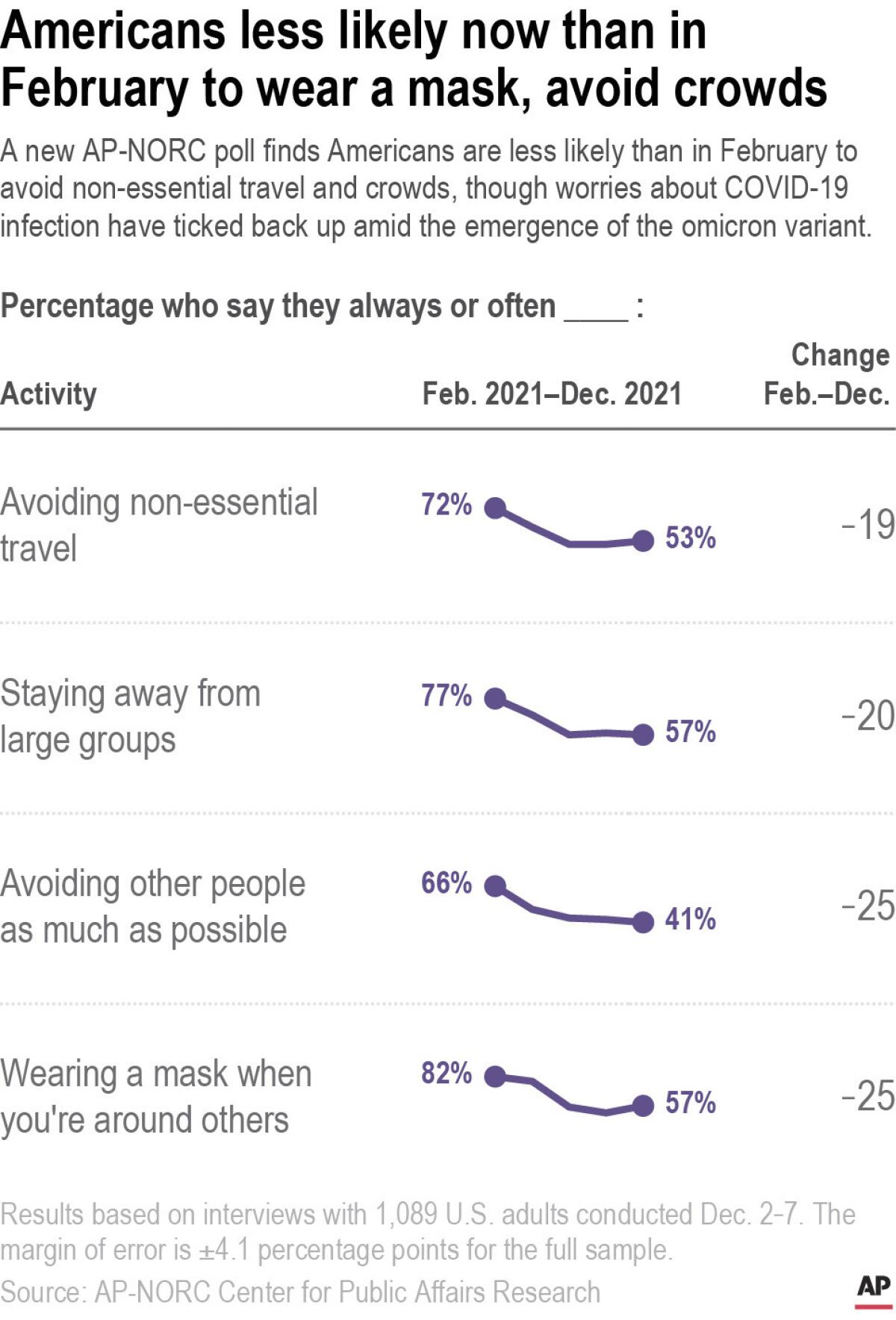
Tara Kirk Sell, a senior scholar at the Johns Hopkins Center for Health Security, said people become less likely to alter their lives as a threat becomes familiar to them.
“We’ve been dealing with COVID for a long time, and we’re going to be dealing with it for a long time,” she said. “People are going to want to do things, so the focus should be on how can we help people think through those risks ... rather than saying don’t do ‘x’ or focusing on getting to zero risk.”
Those calculations differ from one person to another, Sell said. For instance, parents of children younger than 5 who are not yet approved for COVID-19 vaccines or people living with elderly relatives may have a lower tolerance for risking infection.
With immunity waning and the Omicron variant looming, many scientists are saying the definition of ‘fully vaccinated’ should include a booster shot.
John O’Dell, a 25-year-old from Nashville, said getting his initial vaccination and a booster shot made him more comfortable getting together with friends, eating at restaurants and attending NFL and NHL games along with large crowds this year. But he also said looser rules on mask-wearing in Tennessee has influenced his own relaxation on wearing masks or avoiding people.
This week, O’Dell and his father spent several hours browsing a Nashville mall for Christmas gifts, and he’s looking forward to visiting movie theaters to see several films set for release this month.
“It’s a total, complete flip,” he said, comparing those outings to his approach of masking and staying home a year ago.
Gordon, who has diabetes, said emerging coronavirus variants will likely keep him cautious about avoiding crowds and wearing masks in public.
“I just don’t want to take chances, and I feel like I’m doing everything that I can,” he said. “But if they come out with another shot, I’d be in line to get it. I want to stay around a little longer.”
Delta, so far, has been able to elbow out all other variants that otherwise might have spread more widely. Will that be the case with Omicron too?
Americans as a whole remain much less likely than they were in the spring to report that they’re always or often avoiding nonessential travel, staying away from large groups or avoiding other people as much as possible. But the poll shows that those who are vaccinated are far more likely than the unvaccinated to say they are still practicing those behaviors.
David Cotton, a vice president of public health research and evaluation at NORC who did not personally work on the poll, said those results suggest a large portion of Americans remain willing to take precautions more than a year into the pandemic.
“In some ways I find that encouraging, that there are so many people who continue to persist and follow the science and take care of one another,” Cotton said.
Not everyone has returned to the activities that they did regularly before the pandemic, especially things like seeing movies and going to the gym. Among those who say they did so at least monthly prior to the pandemic, 84% say they will visit friends and family in the next few weeks, 80% will shop in person for nonessential items, 73% say they will attend religious services, and 73% say they will go to a bar or restaurant.
The poll shows 58% of those who frequently traveled prepandemic will do so in the next few weeks, and 56% of those who used public transportation will do so.
Fewer — 49% — say they will exercise at a gym or studio or go out to a concert, movie or the theater, among those who did so regularly before the pandemic.
Lines form at British vaccination centers after officials call for all adults to get boosters to prevent an Omicron-driven coronavirus ‘tidal wave.’
The poll shows that about two-thirds of Americans say they find it easy to find factual information about COVID-19 vaccines and when people can get booster shots. Somewhat fewer — 58% — say they think it’s easy to find information about COVID-19 vaccines for children, with the numbers similar among both parents and nonparents.
Still, only about a third of the unvaccinated say they find it easy to find information about vaccines, vaccine boosters or vaccines for children, with similar shares saying it is difficult and the remainder saying it’s neither easy nor difficult.
The AP-NORC poll of 1,089 adults was conducted Dec. 2-7 using a sample drawn from NORC’s AmeriSpeak Panel, which is designed to be representative of the U.S. population. The margin of sampling error for all respondents is plus or minus 4.1 percentage points.
